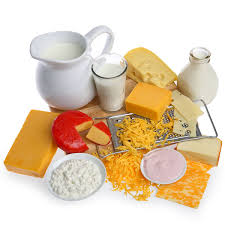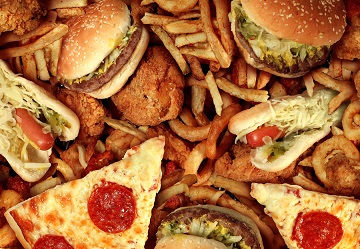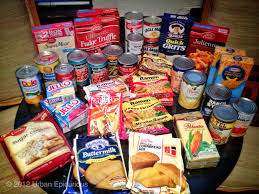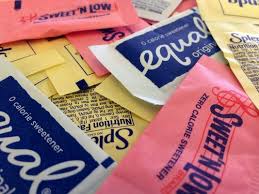Polycystic ovarian syndrome (PCOS) is a metabolic disorder linked to insulin resistance, which will make a woman's level of sex hormones out of balance, causing symptoms such as high cholesterol, increased hair growth, irregular menstrual cycles, skin problems, increased appetite and weight gain. Along with medical treatments, knowing what foods to avoid may help manage your condition.
Foods to Avoid With PCOS
1. High Glycemic Index Foods
Managing blood insulin levels are critical for women who have PCOS. However, high GI foods can cause the blood sugar levels to rise suddenly, leading to increases of insulin production. Therefore high GI foods should be avoided as much as possible. Examples of high GI foods are:
- Many breakfast cereals
- White breads, rolls, biscuits, and baguettes
- Soda and candy
- Cakes and pies
- White pasta and rice
- Packaged soups
- Dried fruits and fruit juices
- Flavored yogurts and ice cream
 2. Dairy Products
2. Dairy Products
Dairy products are foods to avoid with PCOS, as consuming milk products increases the level of testosterone in the body. What's more, a certain type of protein in milk can even limit the processing of testosterone in the body, and the unabated rise in testosterone levels may make PCOS symptoms worse.
3. Soy Products
 Many people who are intolerant to, or avoid dairy products, find soy products a healthy substitute. However, women with PCOS need to know that soy products contain phytoestrogens that can disrupt endocrine function and might cause reduced fertility. Soy can also cause delayed ovulation, which may make matters worse for women with PCOS and who are trying to conceive.
Many people who are intolerant to, or avoid dairy products, find soy products a healthy substitute. However, women with PCOS need to know that soy products contain phytoestrogens that can disrupt endocrine function and might cause reduced fertility. Soy can also cause delayed ovulation, which may make matters worse for women with PCOS and who are trying to conceive.
4. Unhealthy Fats
 Unhealthy fats are among the worst foods to avoid with PCOS. Unhealthy fats include hydrogenated fats, trans-fats and saturated fats. Unsaturated fats can be found in dairy products and red meat. This kind of fats may aggravate the symptoms of PCOS by increasing abnormal blood fat levels and the production of oestrogen. Trans fats and hydrogenated fats are found in processed foods, margarine, and cooking oil. They can increase the risk for diabetes and coronary artery disease that may lead to heart attack in women with PCOS.
Unhealthy fats are among the worst foods to avoid with PCOS. Unhealthy fats include hydrogenated fats, trans-fats and saturated fats. Unsaturated fats can be found in dairy products and red meat. This kind of fats may aggravate the symptoms of PCOS by increasing abnormal blood fat levels and the production of oestrogen. Trans fats and hydrogenated fats are found in processed foods, margarine, and cooking oil. They can increase the risk for diabetes and coronary artery disease that may lead to heart attack in women with PCOS.
5. Caffeine
 It’s well known that 4 or more cups of coffee a day can affect fertility in women. Caffeine can increase the levels of estradiol, an oestrogen hormone, which affects menstruation and ovulation in women. Since PCOS already has a direct impact on fertility, caffeine can only make things worse.
It’s well known that 4 or more cups of coffee a day can affect fertility in women. Caffeine can increase the levels of estradiol, an oestrogen hormone, which affects menstruation and ovulation in women. Since PCOS already has a direct impact on fertility, caffeine can only make things worse.
6. Alcohol
 Alcohol consumption increases the risk of PCOS by almost 50%. Regular alcohol intake puts a lot of pressure on the liver, an important organ that eliminates excess oestrogen from the body. The liver becomes overburdened processing the alcohol, while removing oestrogen becomes a secondary priority, which creates an elevated level of oestrogen in the body. Additionally, alcohol will be converted into sugar, which then contributes to elevated insulin levels. All of these factors will only make things worse for women who have PCOS.
Alcohol consumption increases the risk of PCOS by almost 50%. Regular alcohol intake puts a lot of pressure on the liver, an important organ that eliminates excess oestrogen from the body. The liver becomes overburdened processing the alcohol, while removing oestrogen becomes a secondary priority, which creates an elevated level of oestrogen in the body. Additionally, alcohol will be converted into sugar, which then contributes to elevated insulin levels. All of these factors will only make things worse for women who have PCOS.
7. Processed Foods
 Processed foods are also among the worst foods to avoid with PCOS. Additives such as chemicals, preservatives, and artificial flavorings in processed foods will increase the release of prostaglandins, a hormone that can trigger inflammation, which in turn will increase the level of insulin in the body and make the symptoms of PCOS more serious. Avoid processed foods such as smoked meats, pre-made broths, canned soups, canned vegetables, salted nuts, and chips.
Processed foods are also among the worst foods to avoid with PCOS. Additives such as chemicals, preservatives, and artificial flavorings in processed foods will increase the release of prostaglandins, a hormone that can trigger inflammation, which in turn will increase the level of insulin in the body and make the symptoms of PCOS more serious. Avoid processed foods such as smoked meats, pre-made broths, canned soups, canned vegetables, salted nuts, and chips.
8. Artificial Sweeteners
 Artificial sweeteners can affect how your body responds to sugar or carbohydrates when you consume them. They have also been linked to an increase in testosterone and oestrogen levels, and are known to aggravate inflammation, making PCOS symptoms more serious. What's more, artificial sweeteners may also cause insulin levels to go higher after consuming them. Because artificial sweeteners are so much sweeter than sugar, the sweet taste can trigger the body to prepare for a large intake of calories. When this doesn’t happen, the body then becomes confused, and either demands more food, or burns less energy, resulting in weight gain. While weight gain is another risk factor for PCOS.
Artificial sweeteners can affect how your body responds to sugar or carbohydrates when you consume them. They have also been linked to an increase in testosterone and oestrogen levels, and are known to aggravate inflammation, making PCOS symptoms more serious. What's more, artificial sweeteners may also cause insulin levels to go higher after consuming them. Because artificial sweeteners are so much sweeter than sugar, the sweet taste can trigger the body to prepare for a large intake of calories. When this doesn’t happen, the body then becomes confused, and either demands more food, or burns less energy, resulting in weight gain. While weight gain is another risk factor for PCOS.
